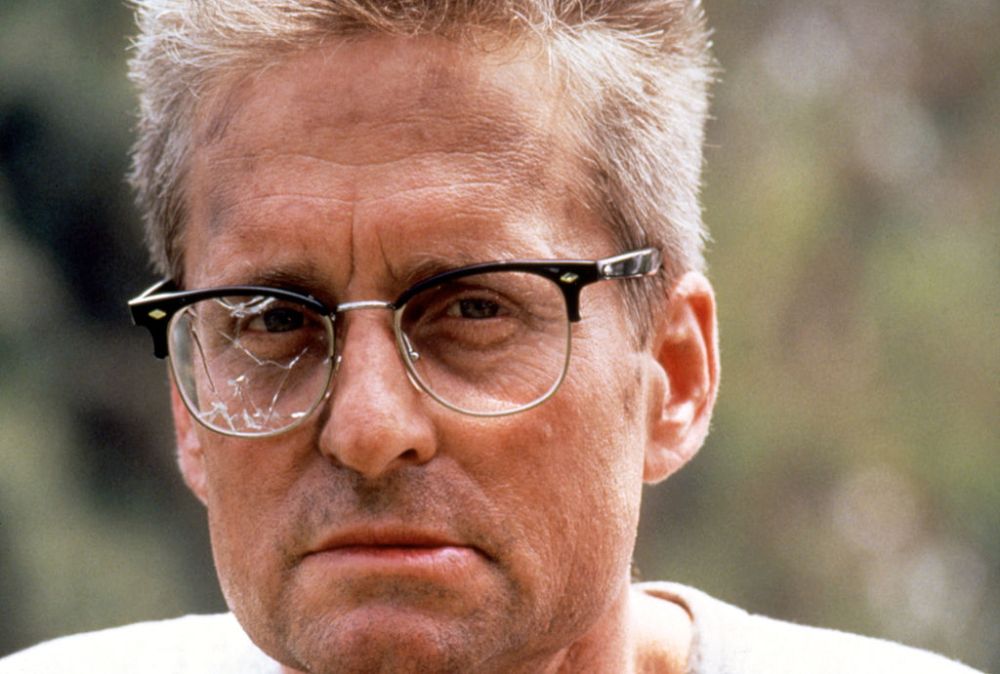Dear Reader (including the particularly flamboyant rodents),
I think we need a remake of the movie Falling Down.
Let me be clear: I’m not a huge fan of the original, starring Michael Douglas as William “D-Fens” Foster. But it’s a significant cultural document. It didn’t start the “national conversation” about “angry white males” in the 1990s, but it certainly helped it go mainstream. The character goes by the name D-Fens—his vanity license plate—because he’s a laid-off defense contractor who takes out his rage on the world.
The most famous scene in the film comes at the end—spoiler alert—when at the end of a day of rage and rampaging, D-Fens says, incredulously, “I’m the bad guy? … How’d that happen?”
Newsweek ran a cover story with a picture of Michael Douglas’character on the cover titled “White Male Paranoia.” Author David Gates wrote, “The white male may still be holding his own (and most of everybody else’s) in the world of hard facts; but in the world of images and ideas—where we also live, and where our feelings about ourselves reside —he’s taking a clobbering.” He was certainly right about the clobbering. And the clobbering continued throughout the 1990s. Hollywood churned out a slew of movies taking white (straight) men down a peg, or 10. The one I hated the most was Regarding Henry, in which Harrison Ford played a master-of-the-universe arrogant white male, who was made decent and kind only after being lobotomized by a bullet.
A couple years after Falling Down came out, the Angry White Male discourse went into overdrive because of the Oklahoma City bombing, when Bill Clinton cynically but brilliantly blamed it on the white male rage fueled by right-wing talk radio. A few years later, Chris Rock and then Toni Morrison started calling Clinton “the first black president.” This became a big refrain in the Lewinsky scandal, but the intent was the same even before: to create a rationale to inoculate Clinton’s behavior as something different than what would be deemed toxic masculinity or white privilege in a Republican.
Now, I should say that I was hugely critical of this stuff back in the day—and remain so in many respects. But given the trajectory of Angry White Male-ism since then, I have to concede that there was more to it than I thought at the time.
But that’s not what I want to talk about. I am willing to accept that the diagnosis had more merit than I appreciated at the time, but the remedy made everything worse. The decades of mocking, belittling, and minimizing of white men made many of the problems with white men worse, not better. I’m not for depriving men—or women—of agency in their own predicaments. The incels and white supremacist poltroons, the Andrew Tate fanboys, the “childless cat lady” choristers, and all of the right-wingers who now insist that the bullying and dishonest, thrice-married adulterer Donald Trump—who puts on makeup every morning—is the epitome of manly virtues and a “manly man” (in the words of one of his super-fawners Tom Klingenstein) shouldn’t be let off the hook for their own choices. But the backlash to this cultural tide is real all the same.
And whatever partisan advantage Democrats got out of this stuff, it’s now a partisan disadvantage as men—white, black, and Hispanic—move out of the FDR coalition into what is now essentially the Trump coalition.
Indeed, it’s a sign of how deep in a cultural bubble progressives are, that Democrats thought Minnesota Gov. Tim Walz could lure a sufficient number of these men back into the Democratic fold. In the same way that, say, Charlie Kirk is an old white right-winger’s idea of what a young person is—or should be—Walz is an MSNBC producer’s idea of what a “real” rural white man is.
It reminds me of the great fun we had with “Pajama Boy” during the Obamacare brouhaha. For those of you who don’t remember, in 2013 the Obama team released a web ad with a smugly smirking “man” in his 20s wearing flannel onesie pajamas drinking some hot cocoa. The tagline: “Drink hot chocolate. Talk about getting health insurance. #GetTalking.”
The ad was only possible in a world where this image is not only what you think young men look like, but what you think they should look like.
Which brings me back to my point. We need a movie in which the anti-hero protagonist is a Fortune 500 DEI commissar or woke university president who loses his or her—or “their”—job and goes on a rampage, only to have a similar “I’m the bad guy” epiphany forced on them.
When Falling Down came out in 1993, the Cold War had recently ended and military budgets fell under the scythe of the “peace dividend.” It only made sense that D-Fens was a laid off defense contractor, because such people were seen as dinosaurs of not just a fading economic era, but a cultural one, too. Hollywood always had a sweet tooth for Chomskyite nonsense about the military industrial complex, and this seemed like the perfect opportunity to indulge it.
Who’s the bad guy?
If you’ll forgive yet another discursion, Hollywood villains are a fascinating cultural topic. And I say that despite the fact that academics who specialize in the question can be incredibly annoying. It’s fascinating because movie villains lay at the intersection of a host of competing interests and factors. Most mainstream movies need villains. Studios want movies to succeed financially. But moviemakers have deep artistic and political convictions and are remarkably susceptible to political pressure and fads. This makes the choice of villain archetypes exceedingly interesting.
For instance, in the 1990s, the fall of the Soviet Union sent studios scrambling for plausible villains. One result: a slew of alien invasion movies. Another was a spike in films about government conspiracies—FEMA was at the heart of one in The X-Files movie. One of the great examples of politics triumphing over storytelling is the treatment of Islamic terrorists before and after 9/11. In the 1990s there were a bunch of movies that cast Middle Eastern terrorists as the new baddie. Movies like Executive Decision and True Lies were bluntly cartoonish about Islamic terrorists. The Siege was more subtle, but more honest, than action movies that came after 9/11. After 9/11, we got a slew of movies that cast the American government as the actual villain. Most of them did poorly because that wasn’t what normal people wanted to see. But they were the kinds of movies the moviemakers thought the little people needed.
Here’s a more enduring example. Hollywood has always loved to depict businessmen and corporate titans as villains. This tendency can be partially explained by the fact that the villain needs power and resources to shape events. It’s hard to cast an underemployed plumber as a conspiratorial mastermind in a James Bond movie. If the villain isn’t going to be a Soviet general, it needs to be Goldfinger or Blofeld or some other globalist master of the universe. But, again, that’s only part of the explanation. Some argue that the reason scriptwriters love to cast corporate fat cats as the baddies is that they hate the studio executives who don’t let them make their movies the way they want without concern for the bottom line.
But let’s not kid ourselves. Hollywood has a long history of casting big business as a source of villainy, with the profit-motive a satisfactory motivation for bad guys. Citizen Kane, Wall Street, Monsters Inc., The Fugitive, China Syndrome—I could list scores of them. Despite the fact that Jurassic Park had already established that dinosaurs are untrainable and unreliable, the last installment I watched involved evil weapons makers thinking they’d be a great substitute for F-16s or something. In The Constant Gardener pharmaceutical companies—which have saved untold millions of lives—are cast as villains who murder Africans with defective drugs on purpose. The director told NPR that pharmaceutical companies make for the “perfect bad guys.”
Now, I’m not a zealot about this. If it’s a good movie I can forgive a lot. And it’s hardly as if corporations and rich people are uniquely virtuous. But you know what you never see? A leader of an Amnesty International type group, a journalist, or a U.N. honcho taking sides with terrorists or foreign enemies. I mean, we do see that in real life. But you don’t see such villains on the big screen.
The one very surprising exception are environmentalists of a certain stripe. Sonny Bunch has been arguing for years that environmentalists make great villains. In the Avengers movies (but not the comics), Thanos is a Malthusian psychopath and the universe’s greatest champion of “de-growth.” In Kingsman: The Secret Service, Samuel L. Jackson has a similar idea: Kill most humans, while preserving the progressive elite, to help the environment. Sonny didn’t mention that this was the goal of several Bond villains as well, but his point is a great one. Environmentalists make for great villains because they want to push the little people around and think they’re a problem to be solved by elites who know better.
Falling Down redux.
Which brings me back to the movie we need. I know people think I am an annoying both-sideser when it comes to politics. But I think people miss the source of my bothsidesism, despite repeated attempts to explain it. I think our culture is shot through with status conflict. I’ve become a modest fan of historian and philosopher René Girard, who argued that a lot of our cultural choices are driven by mimetic rivalry and other concepts I don’t have room to explain here (but did a bit here). The relevant point for now is that a lot of our cultural and political choices are oppositional. When wearing a suit and tie is a sign of status, one of the most powerful ways of asserting dominance is by refusing to wear that uniform. Mark Zuckerberg’s iconic hoodie was a cultural “flex” against the old guard or establishment, in just the same way long hair and tie dye was in the 1960s.
The dominance of the cultural left in elite institutions is at least as strong as the old “white male” cultural hegemony Hollywood declared war on back in the 1990s. (This week’s fiasco at CBS News is a great example of this. A journalist who asked an anti-Israel zealot some pointed questions about his shoddy polemic is being anathematized by the corporate bureaucracy for violating its “standards” while the polemicist is lionized for repeating—and representing—the establishment’s pieties.) The “This is how you got Trump” genre is beyond exhausting. But it’s undeniable that the contempt a lot of Trump backers have for “the establishment,” “norms,” and those who defend them is payback for the elite contempt they’ve been on the receiving end of for decades. The ethos is, “If you people make or enforce all the rules, we’ll simply reject the rules.” The baleful rise in white racism in recent years, at least online, stems in large part from the left’s decision to declare anything it doesn’t like as racist. Of course, sometimes the stuff the left dislikes is actually racist. But the left has lost the authority and credibility to be an arbiter of such things. Saying racist garbage is a way for some (weak and sad) people to fight the power. Saying stupid sexist crap is a reliable way of sticking it to the Woman.
Indeed, one reason a lot of men are breaking with the Democrats and even with higher education is the perception that elite institutions have become “feminized,” and the only safe version of masculinity resides somewhere on the spectrum from Pajama Boy to Tim Walz. I do not necessarily subscribe to that view and I am using the word feminized to describe the worldview of a distinct subset of elite progressive women. But that’s sort of my point. The definition of what it means to be an “enlightened” male on gender issues—or race—is dictated by a very small group of people who live in a bubble. The Latinx enforcers didn’t speak for Latinos, they spoke for a cadre of ideologues imbued with a progressive form of noblesse oblige. The people who think it’s understandable to apologize for or root for gangs of antisemitic rapists and murders aren’t authentic representatives of normal people, they’re intellectual fringe ideologues who just happen to have wildly outsized cultural power and undeserved authority.
A relatively good movie that poked at the monolithic cultural establishment’s excesses and sore spots would be a valuable cultural signal that the cultural establishment is capable of some self-criticism and self-reflection. It would also signal to people who feel ignored and scorned that they aren’t locked out of the conversation. Plus, it would be something new for a change.
Various & Sundry
Canine Update: So we were gone most of the week in Utah, where we had a lovely time (the helicopter ride was a special treat). Kirsten took the dogs for a sleepover. The moment they got to her house, the specialization of labor took over. Zoë immediately went to the dog toy depot to inspect the inventory and to check on her possessions. Pippa went straight to snuggling and bed commandeering. Gracie enjoyed the absence of the dogs and the attention of her personal assistant(s). Zoë got straight A’s from Kirsten for being a team player. She’s really come to love Scout. Given her history with small dogs, we like her turn to mellow mentorship. They were very excited to see us when we finally got home last night, and this morning Pippa insisted on extra belly rubs before agreeing to go out. Gracie is less excited about the return of the dogs.
The Dispawtch

Owner’s Name: Josh Dukelow
Why I’m a Dispatch Member: I crave intelligent news and analysis that isn’t the “same old” stuff from traditional legacy media outlets. I enjoyed Jonah and Steve on Special Report (back when I used to watch cable news), so when I learned about their “pirate skiff,” I eagerly climbed aboard. 10/10, no regrets!
Personal Details: I save up the week’s episodes of The Remnant and listen to all three in a row on Saturday afternoon. I’ve been doing that since 2021.
Pet’s Name: Myrna
Pet’s Breed: Beagle
Pet’s Age: 2
Gotcha Story: Myrna was one of about 4,000 beagles rescued from the Envigo Lab in Cumberland, Virginia, in July 2022. Federal regulators closed down the facility due to severe and repeated violations of health and safety rules. She, along with 30 or so others, made their way to Atlanta in August 2022. We matched through the Atlanta Beagle Rescue and brought Myrna home on September 1, 2022.
Pet’s Likes: Toys, treats, naps, cat food, puppy play dates, and wrestling with our 13-year-old ragdoll cat.
Pet’s Dislikes: Wearing her gentle leader, taking baths, the neighbor’s cat crossing our front yard.
Pet’s Proudest Moment: When she realized she could bust through the baby gate at the bottom of the stairs and raid the cat food.
Moment Someone (Wrongly) Said Pet Was a Bad Dog: When picking her up from daycare, they said she led an escape attempt using Dobermans as decoys. Smart girl!
ICYMI
Now for the weird stuff..







Please note that we at The Dispatch hold ourselves, our work, and our commenters to a higher standard than other places on the internet. We welcome comments that foster genuine debate or discussion—including comments critical of us or our work—but responses that include ad hominem attacks on fellow Dispatch members or are intended to stoke fear and anger may be moderated.
With your membership, you only have the ability to comment on The Morning Dispatch articles. Consider upgrading to join the conversation everywhere.